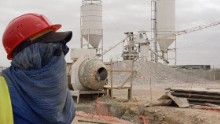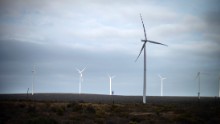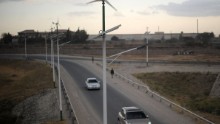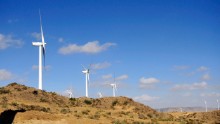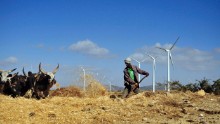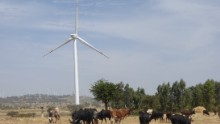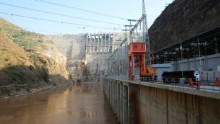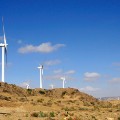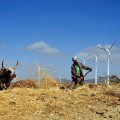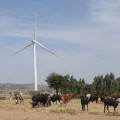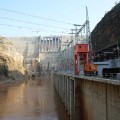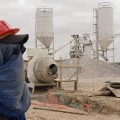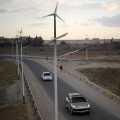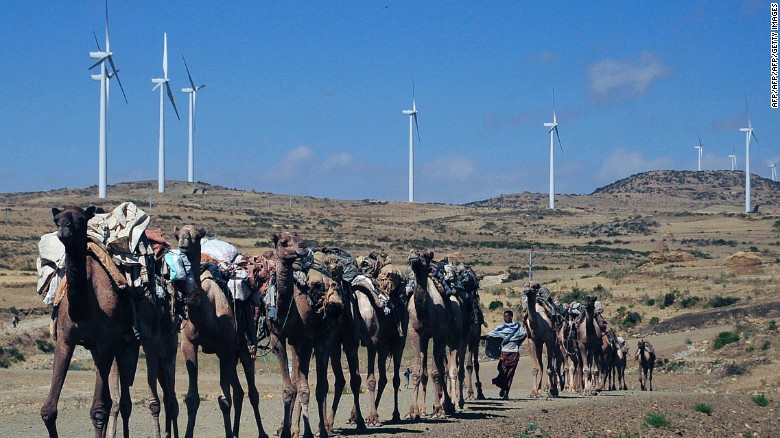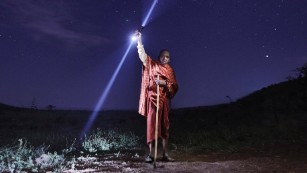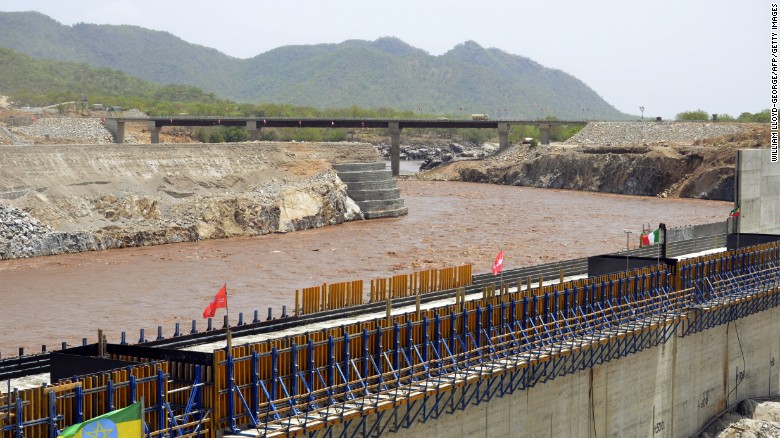South Sudan’s President Silva Kiir visits Egypt for three days to hold talks with his Egyptian counterpart and other officials. Silva Kiir meets Abdel-Fattah Al-Sisi of Egypt to discuss bilateral relations.
During a press conference that was held at the presidential palace in Cairo, South Sudan president praised the Egyptian government’s support for the re-institution of stability in his country, calling on rebel groups to stop weakening his country’s government.
In the same context, Kiir also praised several development projects implemented by Egypt in his country, adding that around six thousand South Sudanese nationals are currently living and studying in Cairo.
A civil war has erupted in the central African country since Kiir sacked Riek Machar as vice president in 2013. As a result, more than 10,000 people have been killed and over 2 million displaced, many of whom have fled to neighboring Uganda, Ethiopia, Kenya and North Sudan.
In December 2013, a UN Security Council resolution authorized the deployment of a peacekeeping mission to the country, comprising 12,500 troops from twenty countries, including Egypt.
A ceasefire was signed between President Kiir and Machar after four days of intense gun battles that killed at least 300 in July 2016.
Is there a “Secret Deal” Between Kiir and Al-Sisi Brokered By Uganda?
Hours after Kiir landed in the Egyptian capital Cairo, allegations surfaced on the presence of a secret deal between Cairo and Juba brokered by Uganda.
A senior SPLM-IO(South Sudan’s armed opposition) official told the South Sudan News Agency (SSNA) in the Ethiopian capital, Addis Ababa that South Sudan’s armed opposition (SPLM/A-IO) accused Cairo and Juba of working on a secret deal to keep South Sudanese President Salva Kiir in power.
However, South Sudanese rebels stated that the main player in these secret negotiations is Uganda that paved the way between South Sudan and Egypt.
In this context, an intelligence source was cited saying that South Sudan and Egypt have been in talks for sometimes.
It is noteworthy that al-Sisi visited Uganda last December 18, 2016.
The rebel official, who asked to remain anonymous in the report because of the sensitivity of the issue, explained that Ugandan President Yoweri Museveni has brokered a “dirty deal” which would allow Kiir to receive lethal weapons and ammunition from Egypt to wage a full-scale war against the armed opposition.
The source said, “There is a dirty deal going between Kiir and Al-Sisi,” adding that “the issue of Grand Ethiopian Renaissance Dam is one of the main deals being finalized in Cairo.”
The source ensured, “Our intelligence sources in Kampala and Juba confirmed that Egypt wants South Sudan and Uganda to be her regional allies so that she can advance its covert sabotage campaign against the Ethiopian Dam. The man [Kiir] is a double agent; he will cause many problems for the entire East Africa region.”
One of the SPLM/A-IO leaders in Cairo also mentioned that some areas in Cairo where South Sudanese live have witnessed increased police activities in recent days, according to South Sudan News Agency.
The source stated that Kiir’s visit aims mainly to issue with al-Sisi Egypt’s interests in East Africa, military deal brokered by Uganda, and ways to maintain peace in South Sudan in case if the current Transitional Government of National Unity collapses.
The source continued, saying Kiir asked al-Sisi to help strengthen relations between Khartoum and Juba so that he could further isolate South Sudanese rebel leader Dr. Riek Machar.
In return, Kiir would assist Al-Sisi regarding the Renaissance Dam issue as Egypt fears that its establishment would have negative repercussion on its water shares from the Nile River.
An Egyptian Newspaper: A tripartite Alliance to Siege Ethiopia
In the same context, an Egyptian newspaper al-Dostour published an article titled: “In Cooperation between Cairo, Juba, and Uganda… Egypt leads a tripartite alliance to siege Ethiopia.”
The Egyptian newspaper mentioned that Egypt seeks to enhance its movements in Africa and especially with the Nile basin countries.
It also reported that Egypt, Juba, and Uganda currently form a tripartite alliance its main target to siege Ethiopia, support Egypt’s interests in the region and put pressure on Addis Ababa’s government if necessary.
Moreover, one of Egypt’s top priority to enhance its influence in Sudan to put pressure on Omar Hassan al-Bashir’s regime if the situation escalated especially that al-Bashir’s policy toward Egypt is changeable and unstable.
In addition, al-Bashir backs Ethiopia against Egypt, according to al-Dostour newspaper.
In the same context, Sudan Tribune (an electronic news portal on Sudan and South Sudan) said, “The three leaders agreed to open training camps for Sudanese armed opposition at Uganda-South Sudan border with the view to topple the Sudanese government for supporting the construction of a dam by Ethiopian government on River Nile.”
“This deal, according to security sources, resulted in dispatching more than big trucks full of Ugandan troops heading to South Sudan,” according to Sudan Tribune.
It added that unconfirmed reports claimed that 20 trucks entered Nimule through Elgu, and eighteen trucks via Ajdumani to Kajokej.”
A source told Sudan Tribune that the mission is to chase the armed opposition figures and to clear out rebellion around South Sudan border with Uganda and Democratic Republic of Congo, though the Uganda government blackmail the people in the region that they are pursuing Uganda Armed oppositions in Northern Uganda, Eastern Uganda and West Nile as a mere political propaganda.
Sudan Tribune also pointed out to the of al- Sisi’s visit to Uganda last month followed by unofficial visit of president Museveni to Juba three days after Egypt President visited Uganda,” in which President Museveni during a closed-door meeting with President Silva Kiir, conveyed the message that he and Egyptian leader to open up a training camp at border with his country.”
According to the Sudanese news site, both Kampala and Juba meetings concluded to provide support to the Sudanese and Ethiopian Armed oppositions which will involve training and providing weapons to SPLM-North, Darfur Rebels both with Military Equipment and full logistics including Finance. “Egypt will supply Uganda then South Sudan will be the corridors to supply the equipment to the SPLM-North, Darfur Rebels and Ethiopian Armed opposition.”
According to media reports, these military training camps will be opened along South Sudan border with Uganda and Congo border. The main aim behind that “to use Congo Central Africa corridors to launch attacks on Sudanese government than using South Sudan Border. The training Camps will be around Mofok and around Lasu,” said Sudan Tribune.
A security source, who preferred to remain anonymous, said that this will be making it o easier for transportation of the Equipment by land because by air it will be difficult because South Sudan air-space is under the control of Sudan.
The source further alleged that the Egyptian government had sent 58 senior military commanders to South Sudan through Uganda to access the ground for training for SPLA, Sudanese and Ethiopian rebels.
He also added that the commanders are from different military units, armor, artillery, air-defense and central military intelligence.
Last August, Sudan Tribune cited military sources saying that South Sudanese recruits largely drawn by the ethnic group of President Salva Kiir and his army chief of general staff, Paul Malong Awan, have been trained by foreign instructors from Egypt and neighboring Uganda to perform airborne landing to seize an enemy’s airfield and retain it until the arrival of the main forces.
Kiir’s Visit to Egypt Will Renew Ethiopia’s Fears
There is no doubt that Kiir’s latest visit to Egypt will alarm Ethiopia that shares the same borders with South Sudan especially after several media reports pointed to a hidden deal between Cairo and Juba regarding the Renaissance Dam.
Kiir’s visit would probably renew Addis Ababa’s fears that al-Sisi would use Juba to cause unrest on the Ethiopian territories taking advantage of Kiir’s need to restore back his power and stabilize his country from the rebel movement.
It is noteworthy that Ethiopia has accused Egypt of destabilizing the country’s national security.
Last December, the Ethiopian prime minister Hailemariam Desalegn said that there are Egyptian institutions harboring, supporting, and funding terrorist groups in Ethiopia, during his interview on Al- Muqabla show aired on Al-Jazeera.
The Ethiopian prime minister’s comments came in response to a question regarding his country’s claims that Egypt and Eritrea are supporting opposition groups in Ethiopia.
Desalegn explained that they repeatedly addressed the Egyptian authorities regarding those institutions, and called on them to take suitable procedures against them and investigate them, adding that Egyptian authorities have denied their relation with these institutions.
Among these groups is the Oromo Liberation Front, he noted.
The minister explained that they need not refer to intelligence findings to obtain information regarding these institutions since the information is already available on the internet and on Egyptian media outlets.
The prime minister said that the support of these institutions will impact relations between both countries, as it targets Ethiopia’s stability.
He concluded that Ethiopia is awaiting Egypt’s response regarding this issue.
Although the anchor pushed the narrative of an Egyptian intervention due to building the Grand Ethiopian Renaissance Dam (GERD), the prime minister denied such claims saying that is not the cause, as the dam will be built without any influence from Egypt or Sudan.
This was not the first time that Ethiopia stated such claims against Egypt. In early October, a video showed members from the outlawed Oromo Liberation Front sharing a stage with what Ethiopian media described as Egyptians.
The Egyptian Foreign Affairs Ministry commented on the video saying that Egypt does not intervene in the internal affairs of other countries.
Ethiopian refugees in Egypt, including people from the Oromo and Amhara ethnic groups, usually arrange rallies in front of the United Nations Higher Commissioner for Refugees (UNHCR) office in Cairo to protest against the Ethiopian government’s violations against opposition groups in their homeland.
The Oromo and Amhara represent the largest ethnic groups in Ethiopia. A significant proportion of these communities have fled Ethiopia due to the persecution and violent treatment by the state. Opposing members of these groups are frequently protesting in Ethiopia causing them to face prison and death.
The Oromo people have an estimated population of 40 million, including 20,000 political prisoners who are accused of belonging to the Oromo Liberation Front, an outlawed group labeled as a terrorist organization.
In late July, two Ethiopian asylum seekers allegedly set themselves on fire in front of the UNHCR as part of a protest led by the Oromo community that sought to demand the right to seek asylum with the UN office.
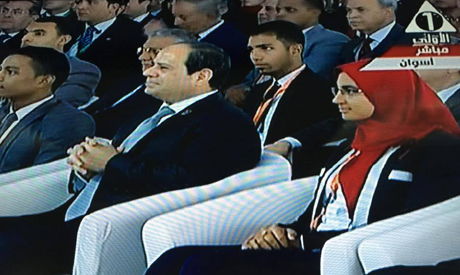




 Egyptian protesters run for cover from tear gas fired by riot police during a Cairo demonstration against the handing over of two Red Sea islands to Saudi Arabia, April 25, 2016. (AFP/Mohamed el-Shahed)
Egyptian protesters run for cover from tear gas fired by riot police during a Cairo demonstration against the handing over of two Red Sea islands to Saudi Arabia, April 25, 2016. (AFP/Mohamed el-Shahed)
![President of South Sudan, Salva Kiir Mayardit (L) is welcomed by Egyptian President Abdel Fattah el-Sisi on 10th January 2017 [Egyptian Presidency - Handout/Anadolu]](https://i1.wp.com/www.middleeastmonitor.com/wp-content/uploads/2017/01/2017_1_10-President-of-South-Sudan-Salva-Kiir-Mayardit-L-is-welcomed-by-Egyptian-President-Abdel-Fattah-el-Sisi-.jpg?resize=1200%2C800&quality=75&strip=all&ssl=1)
